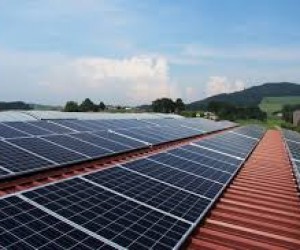In June 2018, Bouake, the second largest city of Cote d’Ivoire, suffered its first-ever shutdown of domestic water supply. The country’s dammed lake, which supplies 70 percent of the city’s water supply, completely ran dry. According to many experts, this was yet-again another consequence of climate change.
As a result of the drought, the people of Cote d’Ivoire went through extraordinary hardships affecting everything in their daily life, from acquiring clean drinking water and cooking to basic hygiene. The story of Bouake is one of many currently unfolding in Africa, where climate change has consequences of a magnitude never-seen-before globally.
To battle climate change, keep up with their pace of development and ensure food security, some countries, like Nigeria, Uganda and Zimbabwe, have resorted to solar energy as a solution. A growing body of research from some of the world’s most renowned energy experts and researchers, has demonstrated in a crystal clear fashion that no other energy source, from hydro to wind, can provide power and have an impact as sustainably, reliably, and efficiently as solar.
Solarplaza decided to highlight this great life-changing potential by publishing “Africa Solar Impact Cases”, an extensive report focusing on a small number of impact cases across the three main areas of solar development in Africa: utility-scale, mini-grid/microgrid and off-grid. They are not all rosy success stories; challenges remain palpable. However, they are able to show that solar energy’s potential to positively impact lives for the long term is greater than ever
One of those cases is the Mashaba project, which is a small village in southern Zimbabwe that installed a 99 kW mini-grid to power 2 irrigation schemes, 2 business centers, 1 school and 1 clinic. Mpokiseng Moyo, a farmer and mother of three, has been able to harvest 15 tonnes of wheat with this new solar system, compared to barely one tonne before the mini-grid was installed. This way the devastating consequences of droughts - inherent to the region, but worsened by the effect of climate change - can be mitigated. “Before being connected to the solar grid, we irrigated our crops using diesel pumps and traveled as far as Gwanda (more than 100km away) to buy diesel for the pumps. The pumps broke down many times, affecting productivity. But with solar energy we are able to farm throughout the year without any hassles,” Moyo said.
Learn more about the Mashaba mini-grid, as well as the deployment of solar vaccine refrigerators (Nigeria), the Tororo solar plant (Uganda), the Entasopia microgrid (Kenya), and several other inspiring stories in the ‘Africa Solar Impact Cases Report’ (https://Africa.UnlockingSolarCapital.com/africa-solar-impact-cases-report/).
If you would like to learn more about the challenges and solutions related to the development and financing of solar projects in Africa, consider attending Unlocking Solar Capital (“USC”) Africa, the African region’s largest and foremost conference on unlocking capital for new solar development. The 2-day conference is organized in partnership with the Global Off-grid and Lighting Association (GOGLA) and will be held in Kigali, Rwanda on the 7-8th of November, 2018. The event will be aimed at bringing together hundreds of solar stakeholders, such as representatives from solar developers, development banks, investment funds, EPCs, IPPs and others, and is wholly focused on unlocking capital for new solar project development in Africa. For more information on Unlocking Solar Capital Africa, please visit: https://Africa.UnlockingSolarCapital.com
Distributed by APO Group on behalf of Solarplaza.










